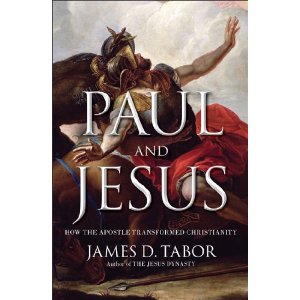Mark Mattison’s Review Paul and Jesus
Mark Mattison has just posted a review of James Tabor’s new book Paul and Jesus on “The Paul Page,” a web site that critically explores current academic research on Paul, especially as related to what has been called “The New Perspective,”. James Tabor’s recent blog post titled “Did Paul Form a New Religion Called Christianity” addresses some of the new perspectives as he understands them. “The Paul Page” is a web site well worth browsing with its thick archive of materials dealing with all aspects of the latest research on Paul.
 Here are excerpts of Mark Mattison’s book review. For the full review click here.
Here are excerpts of Mark Mattison’s book review. For the full review click here.
James D. Tabor, Simon & Schuster, 2012, 320 pp. (click here to purchase)
Books that challenge conventional wisdom and provoke spirited dialogue can be much more valuable than books that simply reiterate popular opinion or buttress our own personal convictions. James D. Tabor, author of The Jesus Dynasty, has provided just such a book in his latest Paul and Jesus: How the Apostle Transformed Christianity. Although this book is intended for the general public instead of scholars, nevertheless anyone invested in the question of Paul and Christian origins should find this book to be particularly stimulating.
Tabor’s argument seems most compelling in its historical depiction of Paul in stark contrast with James and the Jerusalem apostles. He persuasively demonstrates the degree to which the author of the Acts of the Apostles champions Paul over against James; although Luke clearly knew about James the brother of Jesus from his sources (cp. Mark 6:3 with Luke 4:22; Mark 15:47 with Luke 23:55), nevertheless he never even mentions James until he inexplicably introduces him as the undisputed leader of the Christian movement at the Jerusalem council in Acts 15:13-21 (p. 33). This discussion effectively sets the stage for a serious reconsideration of Paul’s strained relationship with Jesus’ immediate disciples in the struggle over apostolic legitimacy and authority within nascent Christianity.
Though Tabor clearly subscribes to the view that Paul was the “second” founder of Christianity (p. 178), however, this reviewer nevertheless appreciates the nuance with which that perspective is described. Although Tabor writes that “Christianity, as we came to know it, is Paul and Paul is Christianity” (p. 24), he is nevertheless just as comfortable writing about a “Christianity before Paul” (p. 9) and a non-Pauline Christianity (p. 25), describing the voice of James the brother of Jesus as “every bit as ‘Christian’ as that of Paul” (p. 39). The language of multiple diverse “Christianities” is arguably more helpful than language implying a monolithic Pauline “Christianity” as over against “Judaism.”
Click here for Mark Mattison’s full review.

